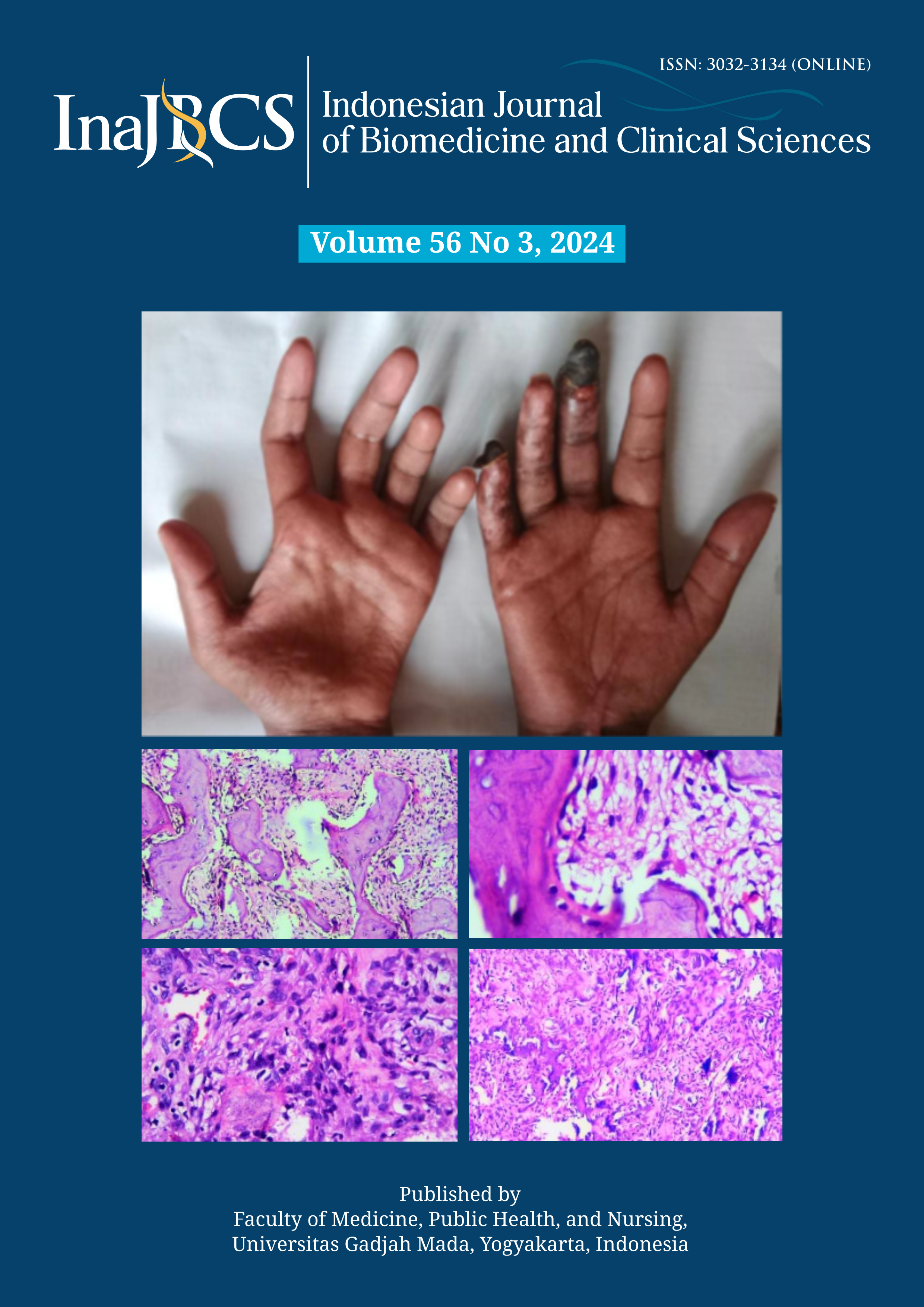Differences in the clinical presentations of anti-NMDAR (anti-N-methyl-D-aspartate receptor) encephalitis with status epilepticus: a retrospective case series
Abstract
Literature on anti-NMDAR (anti-N-methyl-D-aspartate receptor) encephalitis is limited in developing countries, including Indonesia. This retrospective observational case series explored the impact of early diagnosis and treatment on patient outcomes in four distinct cases of anti-NMDAR encephalitis with status epilepticus, and other related conditions, of patients referred to Dr. Sardjito General Hospital, Yogyakarta. Clinical data from May 2021 to August 2023 were collected through the review of medical records, encompassing demographic information, clinical presentation, history, laboratory results, imaging studies, EEG reports, interventions, and the progression of the disease. Four cases were reported, three of whom were diagnosed with anti-NMDAR and one with bacterial encephalitis, each presenting a variety of neuropsychiatric clinical symptoms, leading to hospitalization, extensive testing, and interventions to establish the definitive diagnosis. Cases 1 and 4 have a childhood history of seizures. The cases analyzed factors including the impact of childhood versus adulthood onset and the adherence to taking medicine regularly leading to exacerbation symptoms and relapses. Distinguishing anti-NMDAR encephalitis from related conditions, such as bacterial encephalitis, was further complicated in patients with varied neuropsychiatric presentations (seizures, hallucinations, irritable behavior, headaches) and responses to the treatment. Supporting investigation finds positive NMDAR testing and abnormal CT, MRI, and EEG results, contributed to definitive diagnoses. It could be concluded that comprehensive diagnostic investigations are important for prompt recognition of clinical characteristics, and early initiation of immunomodulatory therapy in managing anti-NMDAR encephalitis and related conditions in Yogyakarta, Indonesia.
References
Samanta D, Lui F. Anti-NMDAR Encephalitis. StatPearls 2023.
https://www.ncbi.nlm.nih.gov/books/NBK551672/
Liu CY, Zhu J, Zheng XY, Ma C, Wang X. Anti-N-methyl-D-aspartate receptor encephalitis: A severe, potentially reversible autoimmune encephalitis. Mediators Inflamm 2017; 2017:6361479.
https://doi.org/10.1155/2017/6361479
Dalmau J, Bataller L. [Limbic encephalitis: the new cell membrane antigens and a proposal of clinical-immunological classification with therapeutic implications]. Neurologia 2007; 22(8):526-37.
Irani SR, Bera K, Waters P, Zuliani L, Maxwell S, Zandi MS, et al. N-methyl-d-aspartate antibody encephalitis: temporal progression of clinical and paraclinical observations in a predominantly non-paraneoplastic disorder of both sexes. Brain 2010; 133(6):1655-67.
https://doi.org/10.1093/brain/awq113
Nguyen L, Wang C. Anti-NMDA receptor autoimmune encephalitis: diagnosis and management strategies. Int J Gen Med 2023; 16:7-21.
https://doi.org/10.2147/IJGM.S397429
Dubey D, Samudra N, Gupta P, Agostini M, Ding K, Van Ness PC, et al. Retrospective case series of the clinical features, management and outcomes of patients with autoimmune epilepsy. Seizure 2015; 29:143-7.
https://doi.org/10.1016/j.seizure.2015.04.007
Titulaer MJ, McCracken L, Gabilondo I, Armangué T, Glaser C, Iizuka T, et al. Treatment and prognostic factors for long-term outcome in patients with anti-N-Methyl-D-Aspartate (NMDA) receptor encephalitis: a cohort study. Lancet Neurol 2013; 12(2):157-65.
https://doi.org/10.1016/s1474-4422(12)70310-1
Quek AM, Britton JW, McKeon A, So E, Lennon VA, Shin C, et al. Autoimmune epilepsy: clinical characteristics and response to immunotherapy. Arch Neurol 2012; 69(5):582-93.
https://doi.org/10.1001/archneurol.2011.2985
Schmitt SE, Pargeon K, Frechette ES, Hirsch LJ, Dalmau J, Friedman D. Extreme delta brush: a unique EEG pattern in adults with anti-NMDA receptor encephalitis. Neurology 2012; 79(11):1094-100.
https://doi.org/10.1212/wnl.0b013e3182698cd8
Viswanathan LG, Siddappa SA, Nagappa M, Mahadevan A, Duble S, Bindu PS, et al. Spectrum and evolution of EEG changes in anti-NMDAR encephalitis. Ann Indian Acad Neurol 2021; 24(3):396-400.
https://doi.org/10.4103/aian.aian_882_20
Mo Y, Wang L, Zhu L, Li F, Yu G, Luo Y, et al. Analysis of risk factors for a poor prognosis in patients with anti-N-Methyl-D-aspartate receptor encephalitis and construction of a prognostic composite score. J Clin Neurol 2020; 16(3):438-47.
https://doi.org/10.3988/jcn.2020.16.3.438
Wang Y, Miao A, Shi Y, Ge J, Wang L, Yu C, et al. Influencing electroclinical features and prognostic factors in patients with anti-NMDAR encephalitis: a cohort follow-up study in Chinese patients. Sci Rep 2020; 10(1):10753.
https://doi.org/10.1038/s41598-020-67485-6
Amugoda C, Foroush NC, Akhlaghi H. Anti-NMDAR encephalitis: higher suspicious needed for earlier diagnosis (Case Report, Literature Review and Diagnostic Criteria). Case Rep Neurol Med 2019; 2019:74766254.
https://doi.org/10.1155/2019/7476254
Graus F, Titulaer MJ, Balu R, Benseler S, Bien CG, Cellucci T, et al. A clinical approach to diagnosis of autoimmune encephalitis. Lancet Neurol 2016; 15(4):391-404.
https://doi.org/10.1016/s1474-4422(15)00401-9
Thaler FS, Zimmermann L, Kammermeier S, Strippel C, Ringelstein M, Kraft A, et al. Rituximab treatment and long-term outcome of patients with autoimmune encephalitis: real-world evidence from the GENERATE registry. Neurol Neuroimmunol 2021; 8(6):e1088.
https://doi.org/10.1212/nxi.0000000000001088
Armangue T, Titulaer MJ, Málaga I, Bataller L, Gabilondo I, Graus F, et al. Pediatric anti-NMDAR encephalitis-clinical analysis and novel findings in a series of 20 patients. J Pediatr 2012; 162(4):850-6.e2.
https://doi.org/10.1016/j.jpeds.2012.10.011
Gong X, Chen C, Liu X, Lin J, Li A, Guo K, et al. Long-term functional outcomes and relapse of anti-NMDA receptor encephalitis. Neurol Neuroimmunol 2021; 8(2):e958.
https://doi.org/10.1212/nxi.0000000000000958
Rahayu YYS, Araki T, Rosleine D. Factors affecting the use of herbal medicines in the universal health coverage system in Indonesia. J Ethnopharmacol 2020; 260:112974.
https://doi.org/10.1016/j.jep.2020.112974
Sumarni W, Darmin S, Sumarti SS, Kadarwati S. Indigenous knowledge of Indonesian traditional medicines in science teaching and learning using a science–technology–engineering–mathematics (STEM) approach. Cult Stud Sci Educ 2021; 17(2):467-510.
https://doi.org/10.1007/s11422-021-10067-3
Kristianto H, Pramesona BA, Rosyad YS, Andriani L, Putri TA, Rias YA. The effects of beliefs, knowledge, and attitude on herbal medicine use during the COVID-19 pandemic: a cross sectional survey in Indonesia. F1000Res 2022; 11:483.
https://doi.org/10.12688/f1000research.116496.1
Das AM, Ramamoorthy L, Narayan SK, Wadwekar V. Barriers of drug adherence among patients with epilepsy: in tertiary care hospital, South India. J Caring Sci 2018; 7(4):177-81.
https://doi.org/10.15171/jcs.2018.027
Gabilondo I, Saiz A, Galán L, González V, Jadraque R, Sabater L, et al. Analysis of relapses in anti-NMDAR encephalitis. Neurology 2011; 77(10):996-9.
https://doi.org/10.1212/wnl.0b013e31822cfc6b
Gresa-Arribas N, Titulaer MJ, Torrents A, Aguilar E, McCracken L, Leypoldt F, et al. Antibody titres at diagnosis and during follow-up of anti-NMDA receptor encephalitis: a retrospective study. Lancet Neurol 2014; 13(2):167-77.





